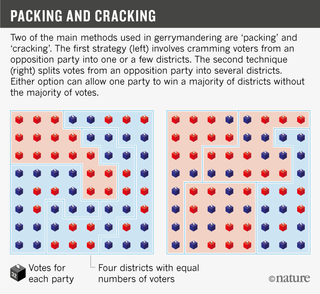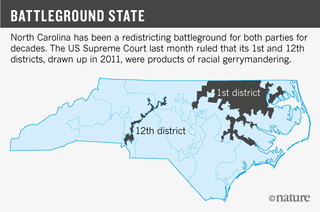Politics
Gerrymandering: Carving Up Minorities In America
America's biggest problem is letting its government misrepresent Americans.
Posted May 14, 2018
What is a person worth in America? There are many ways to measure this. One way is to count the value of their vote.
You might be thinking "one person, one vote." But according to the Electoral Integrity Project, America is the least likely among Western democracies to give each person an equal vote.
This inequality happens in multiple ways. The first is how votes are counted as they move up the chain from local communities to state. This is influenced by how district boundaries are drawn within states to make sure that certain people are under-represented, a process called gerrymandering.
A brief primer on gerrymandering
Consider a state with 1000 residents split into ten districts. Half the residents support party A and half support party B. In an ideal world, one might imagine that state representatives would represent each half, fifty-fifty. But district boundaries are flexible and can be drawn to misrepresent the party currently out of power. For example, one district can be drawn so that it contains mostly party A members, electing party A 95 to 5. The rest of the districts can be drawn so that they elect party B 55 to 45.
The result is that Party A gets one representative and party B gets nine.
This is called packing and cracking. Pack all the members of the opposition party into one district, and then crack the remainder across districts so they never represent a majority in any of the other districts.

The electoral college is gerrymandering at the national level
The second source of inequality in American votes is the electoral college. The electoral college represents state's voters by voting on their behalf. They misrepresent Americans in two ways. First, the electoral college gives states the opportunity to vote in ways that do not represent the diversity of their population. States do this by assigning electoral votes on a winner-take-all basis. Trump had 52% of the votes in Texas (compared with Clinton's 44%), but Trump took all 38 of Texas's electoral votes in Texas' winner-take-all electoral representation. The 48% of voters who did not vote for Trump saw their votes thrown away by the electoral system.
The second way the electoral college misrepresents American voters is that electoral votes are not equally distributed across states in proportion to their population. For example, votes in Wyoming and Alaska count roughly three times more than the vote of a Georgian or a Floridian.
One simple fact demonstrates this inequality at the national level in America: the popular vote has lost the U.S. presidential election twice in the past four elections (2000 Bush-Gore and 2016 Trump-Clinton). If voters had an equal share in determining the political future of their government, the popular vote losing the presidential election would be impossible.
This fact is widely known about American politics. According to the Electoral Integrity Project, America is 55th of 158 nations in electoral integrity (last among Western democracies). Like jumbo fried-shrimp and deafening silence, American democracy is an oxymoron.
But that's not all! America's policies of misrepresentation are made worse because gerrymandering is rigged against minorities. Trump has complained about voter fraud. The reality is that even if the American system worked exactly as its gerrymandered districts and electoral misrepresentation are designed to do, it would defraud millions of American minorities out of the value of their vote.

Devalued voters are not equally distributed across race or education. They tend to be minorities. According to the Center for Economic and Policy Research: "The states that are overrepresented in the Electoral College also happen to be less diverse than the country as a whole." And racial gerrymandering is well-recognized within states (see figure).
Why we need an electoral system
There have been many arguments in favor of the electoral system. The principal argument has been that states deserve equal representation. How else will states defend themselves against the tyranny of the American people? Well, they already do defend themselves in the Senate. The Senate provides each state with equal representation. In the Senate, South Carolina's 4 million people have the same representation as Texas's 27 million people.
Drawing a map and showing that votes don't get distributed equally on that map is absurd. That's a bit like letting people's vote count based on the size of their nose.
Why is misrepresenting American's bad for business
Unequal voting is also bad for America's economy. States that take the lion's share of federal funding (getting back more taxes than they pay) also tend to be states whose votes are overweighted in presidential elections. South Carolina receives $7.87 dollars back from Federal taxes for every $1 they put in. California, on the other hand (which has America's highest GDP per person), gives more than it takes, receiving less than a dollar for every dollar they put in. These numbers change slightly over time, but the argument remains the same.
How could things be fixed?
First, there are laws that prevent partisan and racial gerrymandering, but the laws are often too subjective to be of value.
There are new efforts from the courts to assure partisan symmetry by computing an efficiency gap. Efficiency gap measures how poorly state representatives represent their constituents. One way to measure this is to count the number of "wasted" votes. In our 10-district state example above, Party A wins by 45 more votes than it needs to in the district it wins, and wastes 45 votes in each state it loses. This amounts to 450 wasted votes. Party B, on the other hand, only wastes 50 votes. This amounts to 50 percent of the voters not being represented. The efficiency gap measures precisely what the difference would be if there was proportionate representation.*
Politicians tend to make a lot of fuss about other nations or fraudulent voters, but this a sideshow compared to the real problem. America's voting system is fraudulent by design. Unfortunately, gerrymandering and the electoral college put people into power who benefit from those biased voting systems. The voters whose votes are over-represented would have to be seriously disenfranchised before they would vote for politicians who might change that system. It's not yet clear what to do about that.
References




